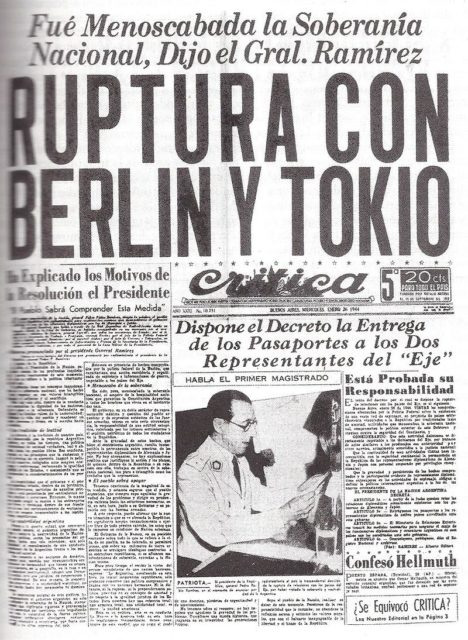Most people know that Adolf Hitler, his wife Eva Braun, Propaganda Minister Joseph Goebbels and his wife, Johanna Maria Magdalena “Magda” Ritschel took their own lives in Hitler’s underground bunker as the Soviets were bombing Berlin. Their fear of capture and execution led them to end their lives with cyanide pills, and Hitler shot himself in the head to ensure his death and ordered his and Eva’s bodies burned beyond recognition.
There were many other officers and important figures of the Third Reich, as well as supporters of Hitler from other countries, that feared capture and were not only welcomed by the Argentinian government but were also assisted in their escape. Juan Peron, president of Argentina, was a Nazi sympathizer and provided travel visas and money to ensure that Hitler’s men had a place to hide. Peron personally welcomed the most notorious members of the Third Reich such as Dr. Josef Mengele, who conducted cruel and heinous experiments on captive Jews, and Adolf Eichmann, the director of the Holocaust.
Many Argentinians had German, Italian, and Spanish backgrounds, and Peron promised perks after the war in exchange for their support. Argentina was already home to important Axis spies, and Peron was an admirer of Nazi principles. Other important figures in Argentina had openly supported the Nazis and devised a plan to declare war on the Axis powers just before the end of the war. This would allow them to have their people in a position to aid Nazi criminals.

Many of the atrocities committed by the Nazi party were not yet public knowledge, so supporters from Swiss banks and the Vatican had no problem in assisting former Nazi officials blend in with the people of Argentina.
When the Nazis overran Poland, France, the Netherlands, Belgium, Luxembourg, Denmark, Yugoslavia, Greece, and Norway, they captured valuable artwork, jewelry, gold, and cash which aided in their move to Argentina. Greedy Swiss bankers had helped them hide their plunder until it was needed.
Peron was convinced that World War III would follow quickly on the heels of World War II. He believed the United States would surely come to blows with the Soviet Union. Peron believed that the anti-communist former Nazis and sympathizers now in Argentina would help him become a powerful leader and Argentina would take its place as one the most significant and authoritative countries in the world. While Peron waited for the war that would not materialize, the true nature of the Holocaust eventually became public.

When Eastern Europe was carved up after World War II, several countries were changed to communist rule. These countries, especially Poland, demanded the Allies turn over the Nazi criminals. Knowing the criminals would end up being executed, the Allies and the Vatican were hesitant in turning them over and quietly allowed their escape to Argentina.
When Peron was deposed in 1955, many of the Nazis moved to other South American countries and lived the remainder of their lives in anonymity. Some of the more prominent members, such as Adolf Eichmann and Josef Mengele, were actively pursued. Eichmann was found in Buenos Aires in 1960 and extradited to Israel where he was executed, but Mengele had adopted a new identity and lived in Brazil until he suffered a stroke while he was swimming, causing him to drown in 1979, About Education reported.

With the passage of time and the exposure of the Nazi death camps, Argentina began to regret becoming a haven for Nazi criminals.
Many of them were bold enough to use their own names, and Dinko Šakić, the commander of Jasenovac, one of the worst concentration camps in the Independent State of Croatia, and Erich Priebke, a former SS captain and participant in the murders of three hundred and thirty Italian civilians, even gave interviews leading to their arrests.
Erich Priebke was sentenced to life in prison, living until the age of 100; and Šakić was sentenced to twenty years but lived in relative comfort while he was imprisoned. He passed away from heart problems in 2008, at the age of 86. Most of the escaped Nazis, however, led quiet lives as businessmen and retirees and were never found.
